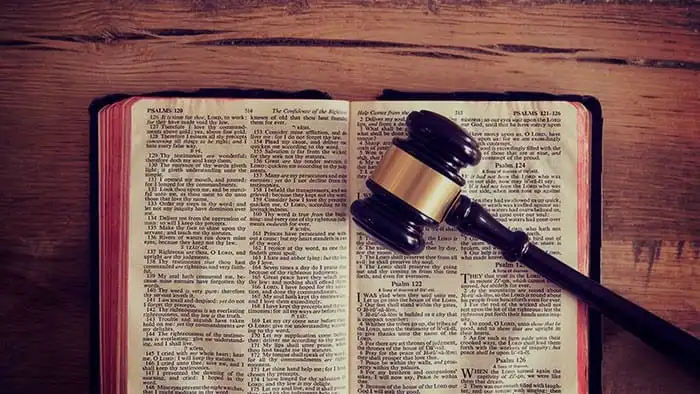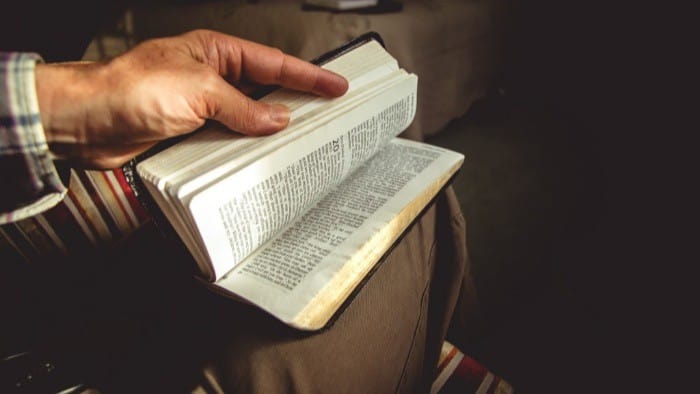24 Informative Bible Verses about Justice

Related Posts
Subscribe To Our Weekly Newsletter
Sign up for our weekly newsletter, Jesus Film Project News, to receive encouraging stories, videos and resources in your inbox.
The topic of justice comes up frequently in Scripture. It’s a major theme of the Old Testament, and it’s central to the heart of the gospel. In the Bible, justice is about relationship. It’s about establishing a right relationship with others, but it’s also about having an unbiased relationship with the truth.
We’ve put together 24 Bible verses that help us understand what God means when He talks about justice.
1. Do not pervert justice (Leviticus 19:15)
Do not pervert justice; do not show partiality to the poor or favoritism to the great, but judge your neighbor fairly.
Ultimately, God’s concern is for impartial justice. We’re not to show a preference for the rich or the poor, but rather to judge impartially. In this way, human judgment reflects the unprejudiced judgment of God.
2. God shows no partiality (Deuteronomy 10:17-18)
For the Lord your God is God of gods and Lord of lords, the great God, mighty and awesome, who shows no partiality and accepts no bribes. He defends the cause of the fatherless and the widow, and loves the foreigner residing among you, giving them food and clothing.
The Bible talks a lot about caring for vulnerable groups: orphans, widows, and foreigners. Families were the stabilizing unit in the ancient near east. As long as you had a family to care for you, you’d never know want. This is why widows, orphans, and foreigners were so defenseless and exposed-and why God contends for them regularly.
3. Cursed is anyone who withholds justice (Deuteronomy 27:19)
“Cursed is anyone who withholds justice from the foreigner, the fatherless or the widow.”
Then all the people shall say, “Amen!”
God was so serious about the issue of justice that He preemptively cursed those who withhold justice from others. This is a stern warning that Israel will ignore too often, which causes them to experience God’s justice.
4. Defend the fatherless and oppressed (Psalm 10:17-18)
You, Lord, hear the desire of the afflicted;
you encourage them, and you listen to their cry,
defending the fatherless and the oppressed,
so that mere earthly mortals
will never again strike terror.
This psalm of praise assures the worshiper that God pays attention to the cries of the oppressed-even when it may not seem that way. The psalmist then says that God protects the oppressed from the terror of mortals who might otherwise ignore or exploit them.
5. The Lord loves justice (Psalm 33:5)
The Lord loves righteousness and justice;
the earth is full of his unfailing love.
We tend to think of “justice” as punishment for wrongdoing. But throughout the Bible, justice is about more than punishment. It’s about seeing that people receive their due. The Hebrew word for justice is mishpat.
The law talks about how the tabernacle priests were to be supported by a share of Israel’s wealth. In Deuteronomy 18:3, this is called “the priest’s due (mishpat).” So we can think of justice as receiving what one is due-both good and bad.
The psalmist tells us that God loves righteousness, but He also loves when people receive what they’re due.
6. Uphold the cause of the oppressed (Psalm 82:3-4)
Defend the weak and the fatherless;
uphold the cause of the poor and the oppressed.
Rescue the weak and the needy;
deliver them from the hand of the wicked.
Psalm 82 gives us a picture of God passing judgment on nations’ gods. He starts by chastising them for defending the unjust and showing partiality to the wicked (vs. 2). Then He shows them what sets Him apart:
- He defends the weak and fatherless.
- He upholds the poor and oppressed.
- He rescues the weak and needy.
Obviously, the “gods” of the nations are being judged because of their followers’ behavior, just like God displays His care for the needy through His people’s obedience.
7. The Lord secures justices for the poor (Psalm 140:12)
I know that the Lord secures justice for the poor
and upholds the cause of the needy.
God always tells us that He secures justice and upholds the cause of the needy. The question that God’s people need to ask themselves is, “How does He do that?”
He does it through the compassionate obedience of His people. That’s why it was so important for Israel to be just and impartial. It was through them that God would take care of the poor and needy.
8. Blessed are those who act justly (Psalm 106:2-3)
Who can proclaim the mighty acts of the Lord
or fully declare his praise?
Blessed are those who act justly,
who always do what is right.
The psalmist tells us that the ones who can best proclaim God’s mighty acts and declare His praise are the ones who practice righteousness and justice. Why? Because their very behavior demonstrates that God is worthy of praise.
9. It’s not good to be partial to the wicked (Proverbs 18:5)
It is not good to be partial to the wicked
and so deprive the innocent of justice.
The Bible frequently tells us that it’s wrong to show favoritism toward the wicked. The problem is that no one thinks that’s what they’re doing. There are a lot of ways that people justify their biases. Maybe they tell themselves that the “innocent” wouldn’t be in trouble if they weren’t guilty. Perhaps they live in a culture where wickedness is normalized.
If we want to be impartial judges, we need to reflect on our natural preferences. That’s where we discover whether we’re genuinely fair.
10. Obedience is better than sacrifice (Proverbs 21:3)
To do what is right and just
is more acceptable to the Lord than sacrifice.
Another theme that crops up in the Bible repeatedly-especially among the prophets-is that God doesn’t want religious sacrifices from stiff-necked and disobedient people. What truly brings the Lord joy is righteousness and justice.

11. Justice brings joy to the righteous (Proverbs 21:15)
When justice is done, it brings joy to the righteous but terror to evildoers.
This proverb is in keeping with the Hebrew word mishpat. When the oppressed or the poor receive their due, it feels like liberation. When the wicked receive their due, it feels fair.
12. It goes well with those who convict the guilty (Proverbs 24:24-25)
Whoever says to the guilty, “You are innocent,”
will be cursed by peoples and denounced by nations.
But it will go well with those who convict the guilty,
and rich blessing will come on them.
Over and over again, the Bible portrays God as unbiased:
- “For the Lord your God is God of gods and Lord of lords, the great God, mighty and awesome, who shows no partiality and accepts no bribes” (Deuteronomy 10:17).
- “Now let the fear of the Lord be on you. Judge carefully, for with the Lord our God there is no injustice or partiality or bribery” (2 Chronicles 19:7).
- “For God does not show favoritism” (Romans 2:11).
- “Anyone who does wrong will be repaid for their wrongs, and there is no favoritism” (Colossians 3:25).
Because there is no favoritism with God, He does not want to see it in His people.
13. Learn to do right (Isaiah 1:17)
Learn to do right; seek justice.
Defend the oppressed.
Take up the cause of the fatherless;
plead the case of the widow.
Isaiah pleads on God’s behalf for Israel to live up to their birthright. While these words are essential for individual Israelites to take to heart, they’re spoken to God’s collective people. To be a society that reflected God’s character, they would have to be a society that was just and compassionate.
14. In faithfulness He will bring forth justice (Isaiah 42:1-4)
“Here is my servant, whom I uphold,
my chosen one in whom I delight;
I will put my Spirit on him,
and he will bring justice to the nations.
He will not shout or cry out,
or raise his voice in the streets.
A bruised reed he will not break,
and a smoldering wick he will not snuff out.
In faithfulness he will bring forth justice;
he will not falter or be discouraged
till he establishes justice on earth.
In his teaching the islands will put their hope.”
God’s coming Messiah would not be like rulers that the Israelites had become accustomed to. He wouldn’t crush the weak. He wouldn’t snuff out smoldering wicks or bypass justice. Jesus would care for the less fortunate and demonstrate true righteousness and justice.
15. Loose the chains of injustice (Isaiah 58:6-10)
“Is not this the kind of fasting I have chosen:
to loose the chains of injustice
and untie the cords of the yoke,
to set the oppressed free
and break every yoke?
Is it not to share your food with the hungry
and to provide the poor wanderer with shelter-
when you see the naked, to clothe them,
and not to turn away from your own flesh and blood?
Then your light will break forth like the dawn,
and your healing will quickly appear;
then your righteousness will go before you,
and the glory of the Lord will be your rear guard.
Then you will call, and the Lord will answer;
you will cry for help, and he will say: Here am I.
“If you do away with the yoke of oppression,
with the pointing finger and malicious talk,
and if you spend yourselves on behalf of the hungry
and satisfy the needs of the oppressed,
then your light will rise in the darkness,
and your night will become like the noonday.”
Isaiah addresses false piety, an issue that Jesus also touches on in the Sermon on the Mount. God is not fooled by people who take part in religious practices but don’t genuinely care about the things close to His heart.
God’s people become a light in the world when they demonstrate His love for others by caring for their well-being.
16. I am the Lord who exercises kindness (Jeremiah 9:23-24)
This is what the Lord says:
“Let not the wise boast of their wisdom
or the strong boast of their strength
or the rich boast of their riches,
but let the one who boasts boast about this:
that they have the understanding to know me,
that I am the Lord, who exercises kindness,
justice and righteousness on earth,
for in these I delight,”
declares the Lord.
What should God’s people boast about? Their strength, riches, or wisdom? No. They should boast in their understanding of the Lord. And what does the Lord want them to understand about Him? That He delights in kindness, righteousness, and justice.
17. Do what is just and right (Jeremiah 22:3)
This is what the Lord says: Do what is just and right. Rescue from the hand of the oppressor the one who has been robbed. Do no wrong or violence to the foreigner, the fatherless or the widow, and do not shed innocent blood in this place.
Jeremiah’s words echo Jesus’s lesson in the Parable of the Good Samaritan. We demonstrate our love for others based on what we do for them. The prophet tells Israel to rescue others from oppressors. It’s not enough to simply not oppress others; God calls us to reveal our love by helping those who are oppressed.
18. Maintain love and justice (Hosea 12:6)
But you must return to your God;
maintain love and justice,
and wait for your God always.
The prophet Hosea pleaded with Israel to return to their first love. They could be reestablished by grace, and all they had to do was maintain love and justice and wait on the Lord.
19. Maintain justice in the courts (Amos 5:15)
Hate evil, love good;
maintain justice in the courts.
Perhaps the Lord God Almighty will have mercy
on the remnant of Joseph.
Amos is another of the minor prophets focused on calling Israel back into relationship with God. As was the case with most of the prophets, these calls centered around justice. In this case, Israel’s court system had become corrupt and biased.
20. Let justice roll on like a river (Amos 5:21-24)
I hate, I despise your religious festivals;
your assemblies are a stench to me.
Even though you bring me burnt offerings and grain offerings,
I will not accept them.
Though you bring choice fellowship offerings,
I will have no regard for them.
Away with the noise of your songs!
I will not listen to the music of your harps.
But let justice roll on like a river,
righteousness like a never-failing stream!
Demonstrations of religious devotion are beautiful when performed by people whose whole lives exhibit a commitment to God. But when religious pageantry is divorced from the things that God actually cares about, God calls it a stench in His nostrils.
21. To act justly and to love mercy (Micah 6:6-8)
With what shall I come before the Lord
and bow down before the exalted God?
Shall I come before him with burnt offerings,
with calves a year old?
Will the Lord be pleased with thousands of rams,
with ten thousand rivers of olive oil?
Shall I offer my firstborn for my transgression,
the fruit of my body for the sin of my soul?
He has shown you, O mortal, what is good.
And what does the Lord require of you?
To act justly and to love mercy
and to walk humbly with your God.
Many of us are familiar with Micah 6:8, “He has shown you . . .” What we’re not as familiar with is the set up for this verse. The prophet speaks from the perspective of someone trying to draw close to God and offering greater and greater sacrifices: thousands of rams, rivers of olive oil, or even their firstborn child.
It’s in this context that Micah says, “He’s already shown you what He requires. To act justly, love mercy, and walk humbly with Him.”
22. Administer true justice (Zechariah 7:8-10)
And the word of the Lord came again to Zechariah: “This is what the Lord Almighty said: ‘Administer true justice; show mercy and compassion to one another. Do not oppress the widow or the fatherless, the foreigner or the poor. Do not plot evil against each other.’”
The seventh chapter of Zechariah opens with the Jews fasting (likely in response to Nebuchadnezzar’s destruction of God’s temple). Again, God uses a prophet to remind the Israelites that the sacrifice He truly desires is justice, compassion, and mercy.
23. Do what you would have them do to you (Matthew 7:12)
So in everything, do to others what you would have them do to you, for this sums up the Law and the Prophets.
Jesus sums up the entire law in one statement, “Do to others what you would have them do to you.” This is very different than “don’t do to others what you don’t want done to you.” The former lifts up the downtrodden; the latter simply doesn’t kick them while they’re down. And that difference sums up God’s view of justice.
You see this in Jesus’s Parable of the Rich Man and Lazarus. A rich man and a beggar named Lazarus both die. The beggar is welcomed into paradise and the rich man suffers in Hades. But it’s not because the rich man abused Lazarus. He simply enjoyed his luxuries every day while ignoring the poor man at his gate.
24. You neglect justice and the love of God (Luke 11:42)
Woe to you Pharisees, because you give God a tenth of your mint, rue and all other kinds of garden herbs, but you neglect justice and the love of God. You should have practiced the latter without leaving the former undone.
The Pharisees went above and beyond in their tithing, but they weren’t demonstrating compassion and practicing justice. They fixated on all the details of the law, but they neglected its spirit.
Sharing the gospel of justice
One of the best things we can ever have is a reconciled relationship with God. So sharing the gospel with every people group in the world-without partiality-is an integral part of what it means to be just. Through Jesus Film Project®, more than 490 million people worldwide have chosen to follow Jesus.


